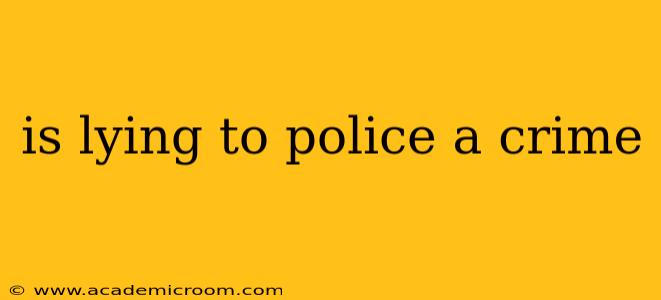Lying to the police is a complex issue, and whether or not it constitutes a crime depends heavily on the context. While simply telling a white lie might not be illegal, deliberately providing false information that obstructs a police investigation or endangers public safety can lead to serious legal consequences. This guide will delve into the intricacies of this issue, addressing common questions and clarifying the legal ramifications.
What are the different types of lies to police?
The severity of lying to police depends significantly on the type of lie and the circumstances in which it's told. A simple misstatement of a minor detail, unintentional or not, carries far less weight than a calculated attempt to mislead investigators about a serious crime.
-
Minor Misstatements: These are generally inconsequential and usually don't result in criminal charges. For example, incorrectly stating your address or age during a routine traffic stop may not lead to legal repercussions.
-
Material Misstatements: These are false statements that are relevant to a criminal investigation. Providing false information about your whereabouts on the night of a crime, for example, could have serious consequences.
-
Perjury: This is the act of lying under oath. This is a far more serious offense than simply lying to a police officer, as it involves a formal legal setting and carries significant penalties. Perjury often involves court testimony but can also arise in sworn statements to law enforcement.
-
Obstruction of Justice: This is a more serious crime that involves intentionally interfering with a police investigation. This could involve lying to police, destroying evidence, or intimidating witnesses.
Can I get arrested for lying to the police?
Yes, you can be arrested for lying to the police, especially if the lie constitutes a material misstatement, perjury, or obstruction of justice. The police have the power to arrest individuals based on probable cause, which means there must be sufficient evidence to believe a crime has been committed. Lying to obstruct an investigation creates such probable cause.
What are the penalties for lying to police?
The penalties for lying to police vary significantly depending on the jurisdiction, the nature of the lie, and the overall circumstances. Penalties can range from:
- Minor fines: For minor misstatements, it is possible you might just get a warning or a minor fine.
- Jail time: More serious offenses like perjury or obstruction of justice can result in substantial jail time and hefty fines.
- Criminal record: A conviction for lying to police will result in a criminal record, which can have long-term consequences for employment, travel, and other aspects of life.
Is it always a crime to lie to a police officer?
No, it's not always a crime to lie to a police officer. The key is whether the lie is material to an investigation and whether it obstructs justice. If the lie is about a trivial matter unrelated to any investigation, and the police officer is not misled by your statements, there's less chance of facing charges. However, it's always best to be truthful and cooperative with law enforcement.
What are my rights if I'm questioned by police?
You have several crucial rights when questioned by police. These include:
- The right to remain silent: You have the absolute right to not answer questions. Invoking this right can prevent you from accidentally making incriminating statements.
- The right to an attorney: You have the right to have an attorney present during questioning. An attorney can advise you on your rights and help protect you from making mistakes.
How can I avoid lying to police?
The best way to avoid any legal trouble is to be completely truthful and cooperative with law enforcement. If you are unsure about something, it's always better to say that you don't know or need to clarify, rather than making a statement that could later prove to be false.
This information is for educational purposes only and should not be considered legal advice. If you are facing legal issues related to lying to police, it's crucial to consult with an attorney immediately.
